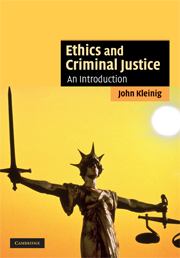Book contents
11 - Punishment and its alternatives
Published online by Cambridge University Press: 05 June 2012
Summary
My object all sublime
I shall achieve in time –
To let the punishment fit the crime.
A person who pleads guilty to or is convicted of a crime normally faces punishment. Should this be the case and, if so, why? Responding to these and some related questions will be our central concerns in this chapter. Of all the ethical issues in the criminal justice system, punishment – at least as a general response to wrongdoing – is the topic that is most thoroughly explored. But it is also riven by deep and persisting disagreements, disagreements that go to the heart of ethical theory. Although we will address some of them, many will have to be put to one side. There is an extensive and rich literature that can be consulted. Our first stop will be to review the nature of punishment – what makes what one person imposes on another a punishment rather than, say, an assault, and how punishment differs from other, similar impositions. We will then briefly review some of the classical debates concerning its justification. And finally we will ask: Are there legitimate alternatives to punishment for crime?
What is punishment?
Although the primary context in which we will be discussing punishment is that of the criminal justice system, it is important to remember that punishment is not limited to and in fact preexists the criminal justice system.
- Type
- Chapter
- Information
- Ethics and Criminal JusticeAn Introduction, pp. 195 - 211Publisher: Cambridge University PressPrint publication year: 2008



